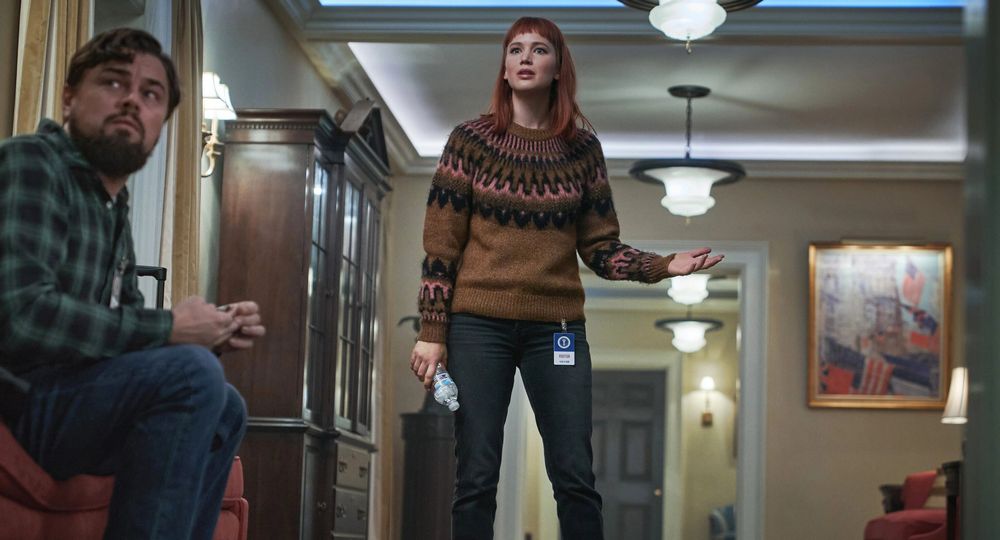Don’t Look Up by Adam McKay is an uncomfortable satire that chronicles the extinction of humanity by a comet. Dr. Randall Mindy (Leonardo DiCaprio) and his student Kate Dibiasky (Jennifer Lawrence) discover the apocalyptic threat six months before it’s set to hit the earth. Unfortunately, President Orlean (Meryl Streep) ignores the duo’s warning.
Aiming to divert attention from a sex scandal, President Orlean finally acknowledges the comet. However, instead of destroying the threat, government officials plan to cash in on the minerals hurtling towards earth. Unsurprisingly, the comet hits the ground, ending all humanity. Some rich humans escape earth, but they die soon after finding a habitable planet.
Don’t Look Up is not a true story as it’s highly unlikely that a comet will hit the earth

Rest easy. It’s unlikely that you’ll look up to see a species-ending comet speeding towards the earth.
Dr. Amy Mainzer, the film’s top science consultant and a professor of planetary science, designed the comet in Don’t Look Up. She based it on the real-life comet, NEOWISE, which scientists discovered in 2020.
In the film, Dr. Randall and Kate discover the comet six months before it hits. Dr. Amy told Techradar that it is plausible to discover a comet that late, but the chances of it happening are pretty low. The chances of a planet-destroying comet hitting the earth are much lower:
“The great news is that it’s a very, very, very unlikely scenario. And we know this to be true because the last impact of this class was 65 million years ago – the one that wiped out the dinosaurs. It can’t happen very often or we wouldn’t be here, right? It’s very unlikely that human life would have evolved if the planet was constantly getting pummeled by these big impactors.”
Improbable doesn’t mean impossible, however. Scientists monitor space objects like asteroids and comets to establish their orbits and the likelihood of them colliding with the earth. Dr. Mainzer told Techradar that they have to look out for objects that can cause ‘severe regional damage.’ She said:
“The less good news is that there are plenty of objects out there that are large enough to cause what I would call severe regional damage, and we still haven’t found most of those. We have a lot more work to do there. So from my standpoint, the sensible thing to do is to just go look for these asteroids and comets.”
Scientists are doing a great job monitoring space objects and should promptly warn if any comet or asteroid threatens to hit the earth. Dr. Ava opines that we can deal with a Don’t Look Up level threat if we discover it early enough. She said:
“What we would do depends a lot on the circumstances of the discovery. If we can find the objects when they’re two decades away from any impact, we have lots of options, and our chances of being able to successfully move something out of the way are greatly increased.”
The film pleads with humanity to respect scientific findings or risk extinction
‘Based on real events that haven’t happened’ reads a section in the film. While it’s uncertain that a comet will hit the earth, humanity faces other extinction-level threats, including climate change and severe weather.
Scientists have warned us about the effects of these events if we fail to take action, but some leaders have refused to listen. In Don’t Look Up, the president focuses on her political ambitions rather than the fast-approaching comet.
Dr. Amy revealed that she and several of her colleagues have had their findings dismissed by people without the facts:
“This has happened a number of times in my career. I know it’s happened to a lot of my colleagues, where you see examples of scientists just really being marginalized, either by conspiracy theories or by special interests. That’s really not good for anybody because as messy as the scientific process is, it is the best thing that we’ve got for basically being able to get the best answers.”
Dr. Mainzer opines that people’s distrust of science presents a greater risk to humanity than any asteroid or comet. She hopes that the film impacts people positively and sparks a shift towards belief in science. Dr. Amy concluded:
“You know, the very best art gets people talking and creates conversations and that’s what we hope the movie will do. It should make you laugh, but it’s also a really powerful tool for helping us to reflect on ourselves a little bit and out behavior. It’s important to be able to laugh at ourselves, because that the basis of humility and recognizing that we need to do better.”